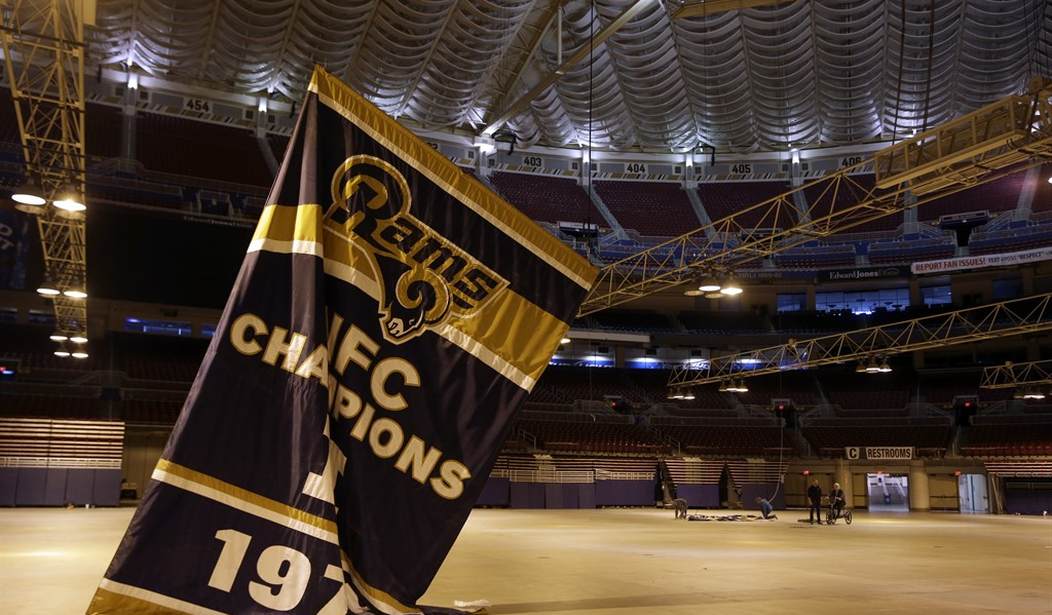St. Louis has decided to fight back against the NFL’s relocation of the Rams to the West Coast. The city and some regional allies have filed a billion-dollar lawsuit against the league and each of its 32 teams, for acting as a monopoly and unfairly denying them the opportunity to keep the team. Coming more than a year after the relocation decision, this looks like a Hail Mary play — or maybe a bargaining chip for future expansion:
The city of St. Louis and other regional entities filed a lawsuit Wednesday against the NFL and all 32 of its teams and owners. The plaintiffs are seeking more than $1 billion in damages, claiming the league violated its own relocation policies in approving the Rams’ move to Los Angeles, a decision that inflicted great economic harm on the place the team had called home for 21 years.
The suit, filed in a Missouri Circuit Court on behalf of the city, St. Louis county and the St. Louis Regional Convention and Sports Complex Authority, cited the relocation policy the NFL adopted in 1984 to avoid antitrust liability. The plaintiffs said the Rams failed to meet the “identified objective factors” for relocation and failed to negotiate “in good faith” with St. Louis authorities.
In addition, the team was accused of making false statements about its desire to remain in St. Louis and concealing a plan to move to Los Angeles that was hatched several years before the relocation bid, which was approved by the NFL in January 2016.
Golly, that sure sounds … familiar. It sounds a lot like the actions of the Los Angeles Rams, its then-owner Georgia Frontiere, and the city of St. Louis when the Rams packed up and moved out there in 1995. Frontiere blamed fans for failing to support the team, but the NFL owners felt the problem was Frontiere’s management of the team she had inherited from the late Carroll Rosenbloom in 1979. Only after she threatened her own lawsuit against the league did the NFL acquiesce and give Frontiere permission to move the Rams to St. Louis — a decision which the city helped expedite with tens of millions in pot-sweeteners.
Of course, St. Louis had earlier gotten stiffed by the Cardinals, and LA stole the Rams from Cleveland several decades earlier too, so fair play all around. Or so it seemed until this round, when St. Louis’ leaders have belatedly found themselves shocked, shocked at relocation politics and finance.
What grounds do the city and its allies cite for the lawsuit? For one thing, they want compensation for all of the money they spent trying to woo owner Stan Kroenke to remain in St. Louis, even though his large investment in Los Angeles real estate over the last several years made it rather clear he was planning a relocation. Rather than blame themselves for not coming to the obvious conclusion three years ago, they are alleging “fraudulent misrepresentation” by Kroenke and the rest of the league, along with breach of contract and tortious interference and unjust enrichment.
The risk-reward on this lawsuit is probably low enough to make it worthwhile as a desperation play, but don’t expect much to come of it, especially given the history involved. The NFL might just choose to settle, or perhaps negotiate a deal which puts St. Louis in the prime position for the next round of expansion. If that’s the case, though, St. Louis might want to consider that history too. Angelenos heard a lot about expansion in 1995, but the nation’s #2 media market didn’t get a team for twenty years until they lured back the Rams. It might be a long, long wait for the nation’s 18th media market. Long term, their best strategy might be to figure out how to monetize being the Other City when the league’s owners want a new stadium built for them with taxpayer dollars — if they can compete with San Diego for that position.








Join the conversation as a VIP Member